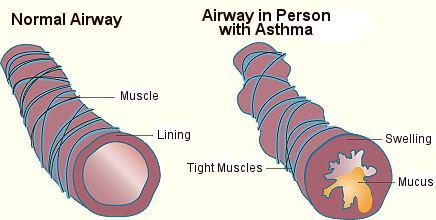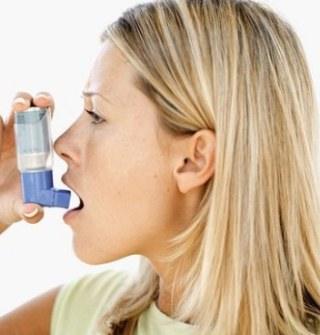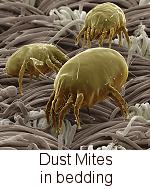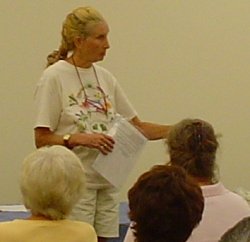Asthma information on symptoms and treatments - Page 1
The following article gives information about the very uncomfortable condition of asthma.
It is true that modern society and pollution has increased asthma levels around the world but you can fight back and help your body increase is defences against asthma. Read on for
more info:
Firstly, what are some asthma symptoms?
Asthma is a condition in which the muscles of the bronchi (the air tubes of the lung) contract in spasms, obstructing the flow of air and making breathing very difficult. In fact breathing out is also very difficult and often more difficult than breathing in.

Asthma can often be triggered by a number of factors, including allergens (house pets, dust etc.), pollution, infection, emotional trauma or physical exertion. Some of the symptoms of asthma can be:
- difficulty in breathing,
- an increase in pulse rate,
- wheezing-especially on breathing out,
- a dry cough,
- a sensation of tightness around the chest.
The reason that brochospasms (contracting lung muscles) can be triggered by allergies is that histamine, the chemical most responsible for allergy symptoms, seems to play a role in asthma attacks as well.
Cigarette smoke, industrial chemicals, aspirin and indoor pollution amongst other things can also trigger an attack.
Two types of asthma
Asthma is divided into two categories:
intrinsic (meaning inside or within), for which there is no identifiable cause for the attacks and
extrinsic, which is caused by something (external factors usually inhaled) that triggers an attack.
Duration of an asthma attack
An asthma attack may be brief or last for several days. Typically, an attack begins within minutes after exposure to a triggering agent. Some patients have only occasional or "seasonal" symptoms, while others have daily symptoms.
Asthma is a life threatening condition in a number of cases. Many people have died due to a severe attack.
Asthma relief
While certain herbs, home remedies or natural medication may help in relieving the condition, it is imperative to listen to your health practitioner.
 If you are on medication, natural alternatives can assist, but should not be taken as a complete substitute. Believe it or not, research has shown that coffee, tea, caffeinated drinks, cocoa and chocolate all contain caffeine as well as other compounds that may help fend off asthma.
If you are on medication, natural alternatives can assist, but should not be taken as a complete substitute. Believe it or not, research has shown that coffee, tea, caffeinated drinks, cocoa and chocolate all contain caffeine as well as other compounds that may help fend off asthma.
Coffee has been shown to be a potent bronchodilator. If caught without your medication, a few cups of coffee could assist in an emergency.
All the products above contain natural anti-asthmatic compounds - theobromine and theophylline.
These chemicals help stop bronchospasms and open constricted bronchial passages. There are of course variables depending on the strength of the brew etc. But on average coffee is the most concentrated form of caffeine, followed by tea, cola drink & cocoa then a chocolate bar. However there are side effects to high consumption of the above, and these should be used only in moderation, and/or in an emergency. Coffee addiction is not advocated.
Minimise exposure to dust and chemical
 You should try to reduce levels of dust around your home and workplace. Dust can trigger an asthma attack very quickly.
You should try to reduce levels of dust around your home and workplace. Dust can trigger an asthma attack very quickly.
You should consider getting special anti-asthma bedding. This includes pillows and special bed sheets which "seal" your mattress when sleeping. Dust mites and bed mites and the droppings from these creatures can be very allergic to asthmatics and efforts spent reducing them are usually well spent.





